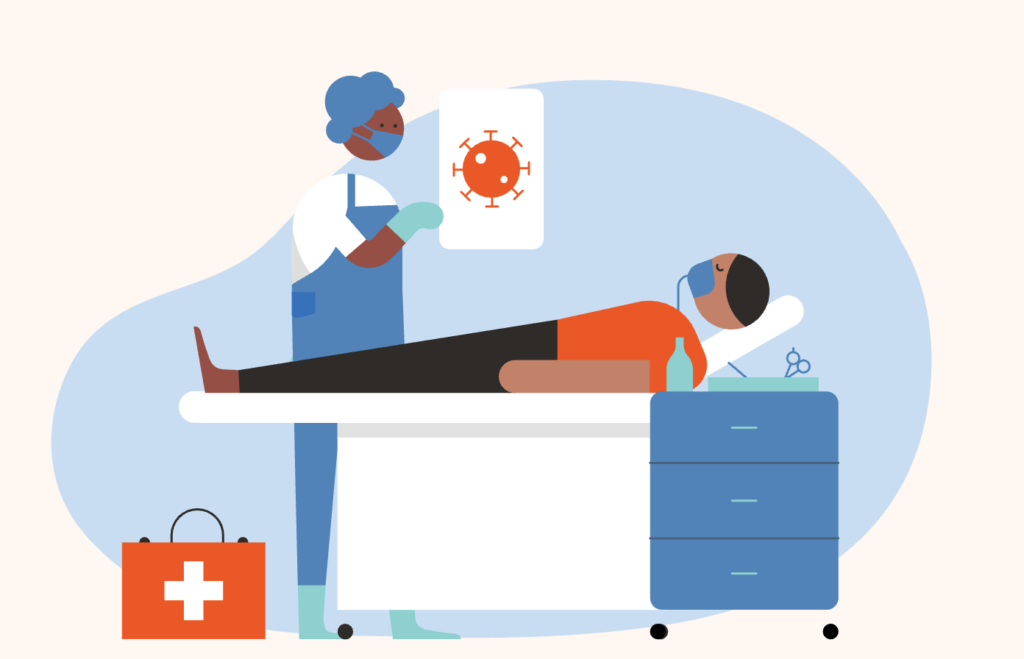Oncologist In Bangladesh
Dr. Mohammad Kamruzzaman, an esteemed Assistant Professor in the Department of Radiation Oncology at the National Institute of Cancer Research & Hospital in Dhaka.
Cancer is a devastating disease that touches countless lives and brings immense emotional challenges for patients and their loved ones. It is during these difficult times that the compassionate care and expertise of Dr. Mohammad Kamruzzaman, a top oncologist in Bangladesh, becomes invaluable.
Dr. Kamruzzaman is a dedicated professional who provides medical guidance and offers support, guiding patients through their cancer journey with hope and resilience. With over 10 years of experience, Dr. Kamruzzaman ensures that cancer patients receive comprehensive and compassionate care. His expertise spans radiation therapy, chemotherapy, molecular targeted therapy, and palliative care, making him a trusted oncologist nationally and internationally.

Understanding Oncology
Oncology is a specialized field of medicine that focuses on the prevention, diagnosis, and treatment of cancer. Oncologists like Dr. Mohammad Kamruzzaman are dedicated to understanding and combating this complex disease and providing the best possible care for cancer patients.
Through advancements in research and clinical practice, oncology plays a crucial role in improving outcomes and enhancing the quality of life for individuals affected by cancer.
Schedule Your Consultation !
Services offered by Dr. Mohammad Kamruzzaman
Treatment options may include surgery to remove the tumor, chemotherapy, radiation therapy, targeted therapy, and immunotherapy. The specific treatment plan depends on the stage and location of the cancer and the individual’s overall health.
Dr. Kamruzzaman, often called the best oncologist in Bangladesh, helps cancer patients combat the disease by employing various treatment modalities such as:
Molecular targeted therapy
Molecular targeted therapy is a cancer treatment that concentrates on particular molecular alterations within cancer cells. It employs medications to obstruct the specific chemicals or processes involved in the growth and survival of cancer cells. Targeted therapy tries to attack cancer cells only, minimizing side effects, unlike chemotherapy, which impacts both healthy and diseased cells. This method can be combined with other therapies and is dependent on the unique characteristics of each patient’s tumour.
Chemotherapy
Chemotherapy is a type of systemic cancer treatment that employs medications to kill or inhibit cancer cell growth. The medicines can be injected or given orally, and they travel throughout the body to target cancer cells. It is an effective strategy for treating many types of cancer and stopping the spread of cancer cells, despite the possibility of adverse effects due to its impact on healthy cells.
Chemotherapy frequently goes hand in hand with other medical procedures like surgery or radiation therapy.
3DCRT
3DCRT is a type of radiation therapy that targets and delivers precise radiation to malignant cells while causing the least harm to normal surrounding tissues. It produces a three-dimensional map of the tumour using cutting-edge imaging methods, like CT scans. This makes it possible to mold and steer radiation beams from various angles so that they take the shape of the tumour. Prostate, lung, and breast cancer are just a few cancers that can be treated using 3DCRT.
IMRT
IMRT is a cutting-edge radiation therapy technique that targets malignant cells with extremely accurate radiation dosages. Using computer-controlled technology, it allows for a more individualized treatment plan by varying the radiation beams’ strength and form. Complex-shaped tumours can be effectively targeted with IMRT while exposing neighbouring healthy tissues as little as possible. This method is beneficial for treating tumours close to vital tissues or when the shape or location of the tumour varies dramatically.
Brachytherapy
Brachytherapy is a form of radiation therapy that involves inserting radioactive sources right into or close to the tumour location. It may be used with external beam radiation therapy or as a stand-alone treatment. Brachytherapy spares the surrounding healthy tissues while administering a high dosage of radiation to the tumour. Gynecological, prostate and some head and neck cancers are all regularly treated with it. Depending on the specific treatment plan, the radioactive sources may be installed temporarily (high dosage rate) or permanently (low dose rate).
Palliative care
Palliative care aims to enhance the quality of life for people with life-threatening illnesses like cancer. It alleviates symptoms and attends to patients’ physical, emotional, and psychological needs. For patients with advanced-stage cancer, palliative care may be provided in addition to curative therapies or as the primary strategy. Its objectives include pain management, symptom control, and improving the general well-being of patients and their families. Palliative care also entails offering comfort, support, and direction throughout the course of treatment to ensure that patients receive comprehensive care and assistance.
Cancer Treatments
Colorectal cancer
Colorectal cancer refers to cancer that develops in the colon or rectum. It is the third most common cancer worldwide.
Head and Neck cancer
Head and neck cancer develops in the tissues of the head and neck area, including the nasal cavity, mouth, salivary glands, and throat. Common risk factors include tobacco and alcohol use, viral infections, and exposure to certain chemicals.
Lung cancer
Lung cancer is a type of cancer that starts in the lungs and can spread to other parts of the body. It is the leading cause of cancer-related deaths globally. Common symptoms include:
Gynecological cancer
Gynecological cancers encompass various types of cancer affecting the female reproductive system, including ovarian, cervical, uterine, vaginal, and vulvar cancer. Regular screenings, such as Pap tests and HPV vaccinations, can aid early detection and prevention.
Brain cancer
Brain cancer refers to the abnormal growth of cells in the brain or surrounding tissues. There are various types of brain tumors, both benign and malignant. Early detection through screening is crucial for successful treatment and improved outcomes,” says medical oncologist Dr. Mohammad Kamruzzaman. “Timely diagnosis and treatment options, such as surgery, chemotherapy, and radiation therapy can significantly impact the prognosis and survival rates.”
Explore Our Patient Resources.
About the Doctor
Dr. Mohammad Kamruzzaman is an Assistant Professor in the Department of Radiation Oncology at the National Institute of Cancer Research & Hospital, Dhaka. With over 10 years of experience, he specializes in radiation therapy, chemotherapy, molecular targeted therapy, and palliative care. Due to his exceptional knowledge and expertise, he is often regarded as the best oncologist in Dhaka, Bangladesh.He holds an MD in Radiation Oncology from Bangabandhu Sheikh Mujib Medical University (BSMMU) and an FCPS in Radiotherapy from Bangladesh College of Physician & Surgeon (BCPS), Dhaka. Dr. Kamruzzaman has received training in various national and international institutes and has actively participated in conferences and workshops. Dr. Kamruzzaman is involved in clinical practice, research, teaching, and providing expert opinions in the field of oncology, making a significant contribution to cancer treatment in Bangladesh.

Gallery









FREQUENTLY ASKED QUESTIONS
Yes, support services and resources are available to assist with the emotional and practical aspects of cancer treatment. These can include counseling, support groups, and educational materials provided by healthcare facilities, cancer organizations, and community organizations.
In Bangladesh, the cost of cancer treatment can vary depending on the type and stage of cancer and the specific treatment modalities.
The approximate treatment costs at a public institution in Bangladesh are as follows:
Radiotherapy session costs: Tk 25,000
Chemotherapy session: Tk 20,000
Surgical procedure: Tk 60,000
At private hospitals, each session might cost between 1,50,000 and 3,000,000.
Financial assistance programs are available in the country, such as government schemes, insurance coverage, and support from non-governmental organizations to provide financial aid to cancer patients.

